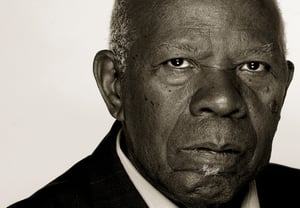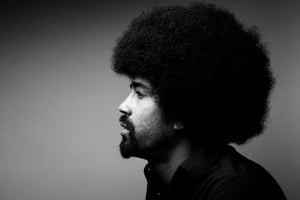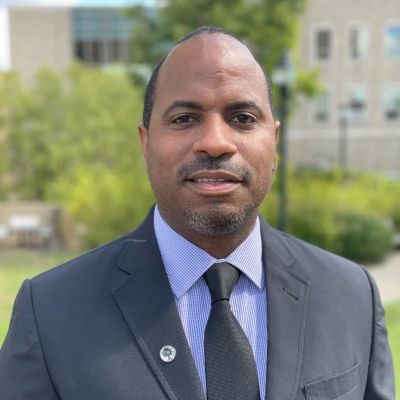- About
- Academics
- Admissions & Aid
- Life
- Research
- News & Events
- Inauguration & Founder's Week
.jpg?width=800&name=bmri-1-fair-scaled%20(1).jpg)
Home
> Academics
> Centers & institutes
> Black men’s research institute
Black Men’s Research Institute
We are pioneering the study the economic, social, cultural, and personal outcomes of issues affecting Black men, particularly where disparities exist in the U.S. and internationally.
The Essence of BMRI
Advancing a more suitably complex narrative will contribute to national and international conversations, scholarship, and higher education curricula, as well as potentially inform public policies focused on Black men and their communities.

ABOUT BMRI
The Black Men’s Research Institute (BMRI) is a pioneering initiative to study the economic, social, cultural, and personal outcomes of issues affecting Black men, particularly where disparities exist in the U.S. and internationally.

PURPOSE
Outcomes experienced by many Black men raise concerning issues, from income disparity to health inequalities to a disproportionate societal association with violence.

THOUGHT LEADERSHIP
BMRI will promote intellectual engagement that is grounded in humanities, humanistic social sciences, and creative arts.

PROGRAMMING
Through research, symposia, public lectures, curriculum development workshops, and other forms of engagement, BMRI will focus on the intersection of culture and social justice by contextualizing Black masculinities in all their manifestations, both within and outside of the U.S.
Black Men’s Research Institute
-
About BMRI
About BMRI
The Black Men’s Research Institute (BMRI) is a pioneering initiative to study the economic, social, cultural, and personal outcomes of issues affecting Black men, particularly where disparities exist in the U.S. and internationally.
Rooted in the scholarship of the humanities, humanistic social sciences, and the creative arts, the institute is unique in its expansive focus on diverse Black masculinities and the positioning of Black men in society as it relates to the intersectionality of race, class, religion, gender, sexuality, identity, politics and policy, history, art, and other factors. By amplifying collaborative thought leadership, the institute strives to fill a void of conflicting narratives, distrust, and ambiguity with a clear, authoritative voice on the experiences of Black men. BMRI will also strengthen the intellectual discovery, discourse, and scholarship at Morehouse in areas related to LGBTQ history, culture, and social challenges, as well as sexism, patriarchy, and misogyny.Initial funding for BMRI has been provided through a four-year, $1.2 million grant from the Andrew W. Mellon Foundation.
As the only higher education institution with a mission to prepare Black men for careers of leadership and service, Morehouse is uniquely positioned to generate new scholarship centered on Black men and their communities through BMRI, as well as to contribute to conversations and inform policy related to social justice. BMRI will also equip Black men and allies to challenge and navigate through a society constructed in ways that may marginalize Black men’s contributions and humanity. In addition, the institute will serve as an incubator for faculty to create curricula and scholarship that can be adopted by other higher education institutions seeking to provide more inclusive and authentic education about Black masculinities. The institute will also serve to convene and facilitate interdisciplinary research by faculty, visiting scholars, and students.
BMRI is designed to facilitate engagement as well as research. The institute, through collaboration with the Morehouse Africana Studies academic program, will serve as a launchpad for the exploration of the first Black masculinities studies minor at a historically Black college or university (HBCU), along with an online certificate program. The institute also plans to launch an annual symposium, through which a single topic will be explored in-depth, a public lecture series, and acknowledge public and community projects that foster a nuanced understanding of policies affecting Black men and their communities.
-
Purpose
The Purpose of BMRI
Advancing a more suitably complex narrative will contribute to national and international conversations, scholarship, and higher education curricula, as well as potentially inform public policies focused on Black men and their communities.
Such an entity based in the unique landscape that Morehouse provides as the only higher education institution dedicated to educating primarily Black men is especially critical now, given the urgent need to create inclusive curricular and programmatic offerings and scholarship/creative work encompassing the humanities, humanistic social sciences, and artistic frames not always connected with understandings of Black men.BMRI goals include:
- Provide a highly visible platform by which faculty, students, and the broader community may engage and, if necessary, counter-narratives and policies that do not attend to the full breadth of experiences and perspectives reflected in an intersectional orientation to Black masculinities.
- Support Morehouse faculty in developing new, innovative courses and reorienting existing courses to focus on Black men in ways that remain relevant but may benefit from updated pedological approaches and theoretical frameworks. Ultimately, the goal is to develop a Black masculinities studies minor for residential Morehouse and Atlanta University Center (AUC) students and an online program for both traditional and non-traditional students.
- Collaborate with AUC partner institutions, the broader higher education community and nonprofit and public organizations to create learning experiences that enhance and complement BMRI’s efforts.
- Support faculty and student scholarship and creative work that contribute to the field of Black masculinities studies
BMRI focuses on the intersection of culture and social justice by contextualizing Black masculinities in all their manifestations, both within and outside of the U.S. An expansive view of Black masculinities means attending to intersectionality with respect to gender, sexual orientation, class, religion, being transgender, and other statuses that inflect the lived experiences of Black men and their communities. Therefore, the Institute also provides a context for the engagement of local, national, and global scholars in meaningful dialog about expanding notions of Black masculinities and Black men’s lived experiences beyond a heteronormative, patriarchal frame
Intellectual EngagementBMRI promotes intellectual engagement that is grounded in humanities, humanistic social sciences, and creative arts. Such engagement will manifest by advancing open intellectual discussion across disciplines and scholarly communities. Multiple views exist on how Black masculinities find expression, influence or are influenced by aspects of culture, or merit consideration when discussing pressing social issues. BMRI will provide a space for those views to engage in dialogue with the express purpose of promoting a richer understanding of Black masculinities.
Social Justice Orientation
BMRI has a clear, public, social justice orientation that aligns with Morehouse’s commitment to advancing the lives of Black men and the African American quest for social change more broadly. BMRI will not only focus on the production of scholarly and creative work, but also seek to influence policies that impact the lives of Black men and youth and, by extension, the entire Black community. This social justice focus may manifest through work with nonprofit agencies, government bodies, private businesses, and other institutions committed to addressing inequities affecting Black men and their communities. BMRI will also ensure that learning about Black masculinities utilizes civic engagement, service learning, and participatory research methods that can both educate students and lend support to address community needs.
Collaboration
BMRI’s emphasis on intellectual engagement and social justice means that it will be in dialog and seek collaborative opportunities with other entities focused on advancing more complex and nuanced understandings of gender and sexuality.
Outcomes
The work of the Black Men’s Research Institute is designed to bring forth several important outcomes:
- Clear, Prominent Voice Addressing Issues/Experiences Related to Black Men and Their Communities: We anticipate that BMRI will express a voice on Black male experiences that may not come through as clearly as would happen with the benefit of Morehouse’s prominence. We envision media outlets and policy practitioners paying attention to BMRI produces or has to say. In this way, we believe BMRI will offer a more nuanced way of understanding Black men’s experiences.
- Contribution to Morehouse Faculty and Student Impact on Social Policy and Perspectives Relevant to Black Men: Morehouse will be able to support scholarship, creative, policy, and curricular initiatives that focus on Black men and their communities. We anticipate that several students, faculty, and individuals/organizations outside of Morehouse will use teaching/scholarship and social justice policy funding to foster change that moves perspectives and policies toward richer, more complex considerations than currently happens.
- Enhanced Reputation for Morehouse and Its Focus on Social Justice Issues Affecting Black Men: Morehouse’s reputation as a locus for pedagogical, scholarly, and policy discussions about Black men will expand. Currently, Morehouse benefits from its legacy of producing influential alumni and dedication to educating Black men and men of color. We anticipate that BMRI will bring more attention to the work that Morehouse faculty and others are doing and increase the likelihood of students pursuing social-justice-oriented activities after they graduate.
-
BMRI Thought Leadership
THOUGHT LEADERSHIP AND SCHOLARSHIP
BMRI will promote intellectual engagement that is grounded in humanities, humanistic social sciences, and creative arts.
Such engagement will manifest by advancing open intellectual discussion across disciplines and scholarly communities. Multiple views exist on how Black masculinities find expression, influence or are influenced by aspects of culture, or merit consideration when discussing pressing social issues. BMRI provides a space for those views to engage in dialogue with the express purpose of promoting a richer understanding of Black masculinities.
BMRI serves as an incubator for faculty to create curricula and scholarship at Morehouse that can be adopted by other institutions seeking to provide more inclusive and authentic education about Black masculinities. BMRI also facilitates research by students, faculty, and visiting scholars contributing to the dynamic field of Black masculinities studies.
An evolving academic interest in the social construction of masculinities emerged from curricular developments in the interdisciplinary fields of Black studies, women’s studies, gender and sexuality studies, men’s studies, queer studies, and cultural studies over the past several decades.
Given the importance of this new interdisciplinary field of study on Black masculinities, which is increasingly being generated by humanities scholars, Morehouse College is poised to contribute in important ways to faculty and curriculum development at the College, throughout the Atlanta University Center (AUC), and at other schools as the field continues to evolve. Morehouse is also positioned to generate new scholarship in the field and convene meetings among scholars in the U.S. and around the world. Having an international focus, especially grounded in the African diaspora, enables interactions with scholars who are producing influential research that impacts public policy and the lives of Black men wherever they live.
BMRI connects the institute with a Morehouse College Black masculinities studies minor (in development- pending approval) and an online certificate program, which will offer an interdisciplinary curriculum and have an academic home within the Humanities Division’s Africana Studies Program. The curriculum will prepare Men of Morehouse and AUC students to think critically about African American and African-diasporic male experiences through a student-centered, integrative approach where students’ questions about Black masculinities shape student outcomes. Students will be empowered to employ interdisciplinary methods rooted in Africana Studies and other salient fields.
-
Programming
BMRI Programming
By engaging scholars, students, researchers, the social justice community, policymakers, and the general public, BMRI will engage in activities that advance understanding of Black masculinities through various disciplinary lenses and as an important consideration for social, cultural, historical, and policy matters.
Programming currently in development includes:
SymposiaAn annual symposium will identify a different topic each year on which three renowned scholars/practitioners would speak. Presenters will deliver an individual paper to which a Morehouse faculty member and student will respond. On the last day of the symposium, all panelists will participate in a concluding round table discussion in which they respond to each other and the audience.
Public Lectures
BMRI will sponsor public lectures that address prominent issues or perspectives on Black male experiences in the United States and internationally. While the focus of the public lectures will include academics able to provide insightful commentary on various subjects, the effort will be made to identify practitioners who may not be affiliated with a college or university but can offer ideas that represent important contributions to ongoing dialogs. Opportunities for connection with Morehouse classes will be promoted to allow for full engagement with ideas and experiences.
Curriculum Development Workshops
Curriculum Development Workshops provide a space for faculty to enhance existing courses or conceive of new classes with multidisciplinary perspectives on Black masculinities studies that are grounded in humanities scholarship.
Teaching and Scholarship Funding
BMRI will provide funding for humanities faculty and students to develop curriculum and engage in scholarship work related to Black masculinities.
Social Justice Funding
BMRI will facilitate grant awards focusing on public and community projects that advance the Institute for Black Masculinities Studies’ goal of fostering more nuanced understandings of policies affecting Black men and their communities.
About BMRI
The Black Men’s Research Institute (BMRI) is a pioneering initiative to study the economic, social, cultural, and personal outcomes of issues affecting Black men, particularly where disparities exist in the U.S. and internationally.
Rooted in the scholarship of the humanities, humanistic social sciences, and the creative arts, the institute is unique in its expansive focus on diverse Black masculinities and the positioning of Black men in society as it relates to the intersectionality of race, class, religion, gender, sexuality, identity, politics and policy, history, art, and other factors. By amplifying collaborative thought leadership, the institute strives to fill a void of conflicting narratives, distrust, and ambiguity with a clear, authoritative voice on the experiences of Black men. BMRI will also strengthen the intellectual discovery, discourse, and scholarship at Morehouse in areas related to LGBTQ history, culture, and social challenges, as well as sexism, patriarchy, and misogyny.
Initial funding for BMRI has been provided through a four-year, $1.2 million grant from the Andrew W. Mellon Foundation.
As the only higher education institution with a mission to prepare Black men for careers of leadership and service, Morehouse is uniquely positioned to generate new scholarship centered on Black men and their communities through BMRI, as well as to contribute to conversations and inform policy related to social justice. BMRI will also equip Black men and allies to challenge and navigate through a society constructed in ways that may marginalize Black men’s contributions and humanity. In addition, the institute will serve as an incubator for faculty to create curricula and scholarship that can be adopted by other higher education institutions seeking to provide more inclusive and authentic education about Black masculinities. The institute will also serve to convene and facilitate interdisciplinary research by faculty, visiting scholars, and students.
BMRI is designed to facilitate engagement as well as research. The institute, through collaboration with the Morehouse Africana Studies academic program, will serve as a launchpad for the exploration of the first Black masculinities studies minor at a historically Black college or university (HBCU), along with an online certificate program. The institute also plans to launch an annual symposium, through which a single topic will be explored in-depth, a public lecture series, and acknowledge public and community projects that foster a nuanced understanding of policies affecting Black men and their communities.
The Purpose of BMRI
Advancing a more suitably complex narrative will contribute to national and international conversations, scholarship, and higher education curricula, as well as potentially inform public policies focused on Black men and their communities.
Such an entity based in the unique landscape that Morehouse provides as the only higher education institution dedicated to educating primarily Black men is especially critical now, given the urgent need to create inclusive curricular and programmatic offerings and scholarship/creative work encompassing the humanities, humanistic social sciences, and artistic frames not always connected with understandings of Black men.
BMRI goals include:
- Provide a highly visible platform by which faculty, students, and the broader community may engage and, if necessary, counter-narratives and policies that do not attend to the full breadth of experiences and perspectives reflected in an intersectional orientation to Black masculinities.
- Support Morehouse faculty in developing new, innovative courses and reorienting existing courses to focus on Black men in ways that remain relevant but may benefit from updated pedological approaches and theoretical frameworks. Ultimately, the goal is to develop a Black masculinities studies minor for residential Morehouse and Atlanta University Center (AUC) students and an online program for both traditional and non-traditional students.
- Collaborate with AUC partner institutions, the broader higher education community and nonprofit and public organizations to create learning experiences that enhance and complement BMRI’s efforts.
- Support faculty and student scholarship and creative work that contribute to the field of Black masculinities studies
BMRI focuses on the intersection of culture and social justice by contextualizing Black masculinities in all their manifestations, both within and outside of the U.S. An expansive view of Black masculinities means attending to intersectionality with respect to gender, sexual orientation, class, religion, being transgender, and other statuses that inflect the lived experiences of Black men and their communities. Therefore, the Institute also provides a context for the engagement of local, national, and global scholars in meaningful dialog about expanding notions of Black masculinities and Black men’s lived experiences beyond a heteronormative, patriarchal frame
Intellectual Engagement
BMRI promotes intellectual engagement that is grounded in humanities, humanistic social sciences, and creative arts. Such engagement will manifest by advancing open intellectual discussion across disciplines and scholarly communities. Multiple views exist on how Black masculinities find expression, influence or are influenced by aspects of culture, or merit consideration when discussing pressing social issues. BMRI will provide a space for those views to engage in dialogue with the express purpose of promoting a richer understanding of Black masculinities.
Social Justice Orientation
BMRI has a clear, public, social justice orientation that aligns with Morehouse’s commitment to advancing the lives of Black men and the African American quest for social change more broadly. BMRI will not only focus on the production of scholarly and creative work, but also seek to influence policies that impact the lives of Black men and youth and, by extension, the entire Black community. This social justice focus may manifest through work with nonprofit agencies, government bodies, private businesses, and other institutions committed to addressing inequities affecting Black men and their communities. BMRI will also ensure that learning about Black masculinities utilizes civic engagement, service learning, and participatory research methods that can both educate students and lend support to address community needs.
Collaboration
BMRI’s emphasis on intellectual engagement and social justice means that it will be in dialog and seek collaborative opportunities with other entities focused on advancing more complex and nuanced understandings of gender and sexuality.
Outcomes
The work of the Black Men’s Research Institute is designed to bring forth several important outcomes:
- Clear, Prominent Voice Addressing Issues/Experiences Related to Black Men and Their Communities: We anticipate that BMRI will express a voice on Black male experiences that may not come through as clearly as would happen with the benefit of Morehouse’s prominence. We envision media outlets and policy practitioners paying attention to BMRI produces or has to say. In this way, we believe BMRI will offer a more nuanced way of understanding Black men’s experiences.
- Contribution to Morehouse Faculty and Student Impact on Social Policy and Perspectives Relevant to Black Men: Morehouse will be able to support scholarship, creative, policy, and curricular initiatives that focus on Black men and their communities. We anticipate that several students, faculty, and individuals/organizations outside of Morehouse will use teaching/scholarship and social justice policy funding to foster change that moves perspectives and policies toward richer, more complex considerations than currently happens.
- Enhanced Reputation for Morehouse and Its Focus on Social Justice Issues Affecting Black Men: Morehouse’s reputation as a locus for pedagogical, scholarly, and policy discussions about Black men will expand. Currently, Morehouse benefits from its legacy of producing influential alumni and dedication to educating Black men and men of color. We anticipate that BMRI will bring more attention to the work that Morehouse faculty and others are doing and increase the likelihood of students pursuing social-justice-oriented activities after they graduate.
THOUGHT LEADERSHIP AND SCHOLARSHIP
BMRI will promote intellectual engagement that is grounded in humanities, humanistic social sciences, and creative arts.
Such engagement will manifest by advancing open intellectual discussion across disciplines and scholarly communities. Multiple views exist on how Black masculinities find expression, influence or are influenced by aspects of culture, or merit consideration when discussing pressing social issues. BMRI provides a space for those views to engage in dialogue with the express purpose of promoting a richer understanding of Black masculinities.
BMRI serves as an incubator for faculty to create curricula and scholarship at Morehouse that can be adopted by other institutions seeking to provide more inclusive and authentic education about Black masculinities. BMRI also facilitates research by students, faculty, and visiting scholars contributing to the dynamic field of Black masculinities studies.
An evolving academic interest in the social construction of masculinities emerged from curricular developments in the interdisciplinary fields of Black studies, women’s studies, gender and sexuality studies, men’s studies, queer studies, and cultural studies over the past several decades.
Given the importance of this new interdisciplinary field of study on Black masculinities, which is increasingly being generated by humanities scholars, Morehouse College is poised to contribute in important ways to faculty and curriculum development at the College, throughout the Atlanta University Center (AUC), and at other schools as the field continues to evolve. Morehouse is also positioned to generate new scholarship in the field and convene meetings among scholars in the U.S. and around the world. Having an international focus, especially grounded in the African diaspora, enables interactions with scholars who are producing influential research that impacts public policy and the lives of Black men wherever they live.
BMRI connects the institute with a Morehouse College Black masculinities studies minor (in development- pending approval) and an online certificate program, which will offer an interdisciplinary curriculum and have an academic home within the Humanities Division’s Africana Studies Program. The curriculum will prepare Men of Morehouse and AUC students to think critically about African American and African-diasporic male experiences through a student-centered, integrative approach where students’ questions about Black masculinities shape student outcomes. Students will be empowered to employ interdisciplinary methods rooted in Africana Studies and other salient fields.
BMRI Programming
By engaging scholars, students, researchers, the social justice community, policymakers, and the general public, BMRI will engage in activities that advance understanding of Black masculinities through various disciplinary lenses and as an important consideration for social, cultural, historical, and policy matters.
Programming currently in development includes:
Symposia
An annual symposium will identify a different topic each year on which three renowned scholars/practitioners would speak. Presenters will deliver an individual paper to which a Morehouse faculty member and student will respond. On the last day of the symposium, all panelists will participate in a concluding round table discussion in which they respond to each other and the audience.
Public Lectures
BMRI will sponsor public lectures that address prominent issues or perspectives on Black male experiences in the United States and internationally. While the focus of the public lectures will include academics able to provide insightful commentary on various subjects, the effort will be made to identify practitioners who may not be affiliated with a college or university but can offer ideas that represent important contributions to ongoing dialogs. Opportunities for connection with Morehouse classes will be promoted to allow for full engagement with ideas and experiences.
Curriculum Development Workshops
Curriculum Development Workshops provide a space for faculty to enhance existing courses or conceive of new classes with multidisciplinary perspectives on Black masculinities studies that are grounded in humanities scholarship.
Teaching and Scholarship Funding
BMRI will provide funding for humanities faculty and students to develop curriculum and engage in scholarship work related to Black masculinities.
Social Justice Funding
BMRI will facilitate grant awards focusing on public and community projects that advance the Institute for Black Masculinities Studies’ goal of fostering more nuanced understandings of policies affecting Black men and their communities.

Executive Director
Dr. Derrick Brooms
Dr. Derrick Brooms is the executive director at the Black Men's Research Institute (BMRI). With a wealth of experience in higher education spanning over twenty years, Brooms is an accomplished scholar, activist, educator, speaker, and writer. His research in the field of education primarily focuses on the journey of Black men and boys as they navigate their way into and through college.